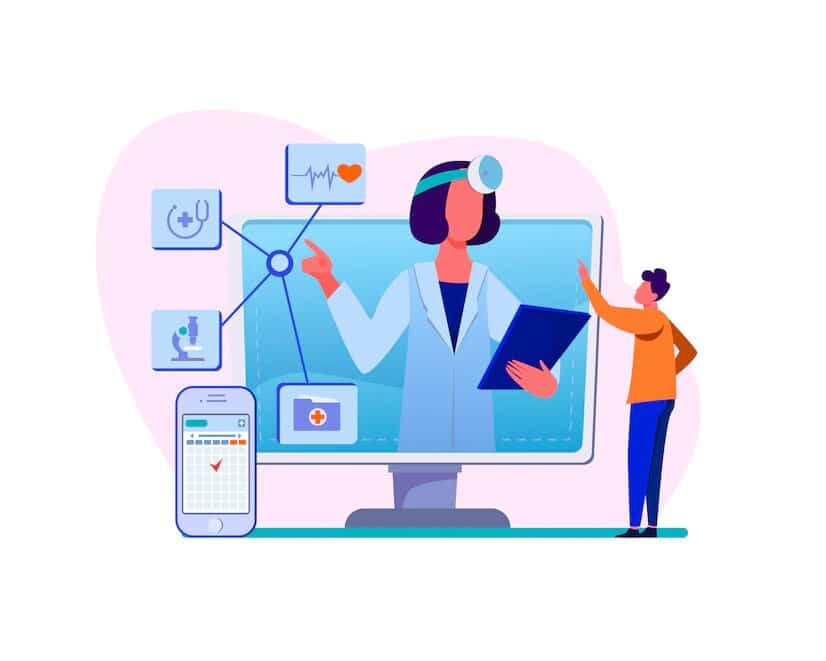In the fight against a virus that has no vaccine, no medicinal research, and no vigorous prevention solutions, it becomes mandatory for all of us to stay home and follow self-quarantine guidelines issued by our honourable authorities.
We all are in a situation where lockdowns and social distancing are the only saviours that can help us sail through the difficult times. At this time, the healthcare systems are all set for adopting the “Telemedicine” and “Telehealth” technologies for facilitating safe and effective communications without compromising the medical aid to those in need.
As per the World Health Organisation Telemedicine is an essential service that will strengthen the response of various healthcare systems to COVID-19.

What is Telemedicine?
The World Health Organisation defines telemedicine as:
“The delivery of healthcare services, where distance is a critical factor, by all healthcare professionals using information and communications technologies for the exchange of valid information for diagnosis, treatment and prevention of disease and injuries, research and evaluation, and the continuing education of healthcare workers, to advance the health of individuals and communities.”
In other words, telemedicine is just a technology that helps people avail of all the medical facilities just sitting at home that minimizes the risk of getting infected by entering healthcare places.
It is a technology that enables healthcare professionals to diagnose, evaluate and treat the patients but at a distance using the telecommunication platforms.
The approach of making healthcare available to all and everyone has seen a remarkable evolution since the last decade.
How does telemedicine work?
Telemedicine is not an appropriate solution for anything that requires immediate hand-on care and examination from doctors. For that reason, certain specialties / procedures are not completely amenable to telemedicine. However, it is an optimal solution for the patients requiring regular medical checkups or just medical consultations.
For instance, a person fears the infection due to a prevailing cut can fix up a video consultation with the doctor and speculate about the symptoms. If necessary, only then the doctor can prescribe to have a meet-up or not.
Telemedicine can either be on video, audio call or in some cases, chat or email. Video is usually the most preferred mode as it allows for the most optimal remote consultation experience for the patient as well as the doctor.
Is it legal in India?
As per the new guidelines by the Medical Council of India, registered medical practitioners are entitled to practice telemedicine.
Benefits of Telemedicine in Covid-19 period
Telemedicine is emerging as a positive contributor in this time of pandemic to facilitate compelling and substantial healthcare solutions to everyone and anyone. It has helped the healthcare system worldwide to encourage prevention, precaution, and treatments to stem the spread of the novel coronavirus.
Telemedicine has a few specific benefits for any healthcare system globally
- Telemedicine enables timely access to medical help for people living in far-flung areas where quality of healthcare infrastructure might not be great.
- Telemedicine is cost-effective and helps save the expenses, especially of rural patients, by removing the need to travel for routine consultations. This is especially useful for regular medical follow-ups that don’t require a great deal of physical examination?
- Adoption of telemedicine will also accelerate adoption and maintenance of electronic health records, something that would go a long way in improving quality of healthcare for each individual.
Telemedicine is a big advantage for India
India is a country where healthcare facilities like hospitals are concentrated in cities or urban areas. People from rural areas have to travel vast distances just for a regular health checkup. Telemedicine will play a crucial role in wiping off this difficulty by making the medical consultations available at one’s place itself. Telemedicine also enables faster and timely access to various medical facilities.
Along with telemedicine, medicine delivery and remote diagnosis capabilities are enabling a truly remote healthcare experience. For instance, ECG can be done through portable devices or the blood sugar can be evaluated easily.
In India, telemedicine will provide an additional much-needed advantage of making the doctors more productive. As per a government report, we have a ratio saying one doctor is for 10,000 people in India, far worse than global standards.
Ayu Health is serving 24×7
Ayu Health is India’s most trusted network of hospitals. Our specialists provide unmatched care across a range of specialties. We have now enabled telemedicine for all doctors, which allows patients to consult with the doctors on video. Ayu Health also enables medicine delivery and home collection of samples for lab tests.
We are committed to helping India fight COVID-19 and let you stay safe, by staying at home!
To book a consultation with a doctor, please visit our website or call us on 08069489584.
Our Hospital Locations
General Surgery Hospitals in Chandigarh | General Surgery Hospitals in Bangalore | General Surgery Hospitals in Jaipur | General Surgery Hospitals in NCR | General Surgery Hospitals in Hyderabad
Our Doctors
General Surgery Doctors in Chandigarh | General Surgery Doctors in Bangalore | General Surgery Doctors in Jaipur | General Surgery Doctors in NCR | General Surgery Doctors in Hyderabad
About the Author

Dr. S. Goel
Dr. S. Goel is a renowned Internal Medicine Specialist currently practicing at Ayu Health, Bangalore. He is a Specialist in Internal Medicine, Diabetes HTN, Paediatric Care, and Family Medicine.



